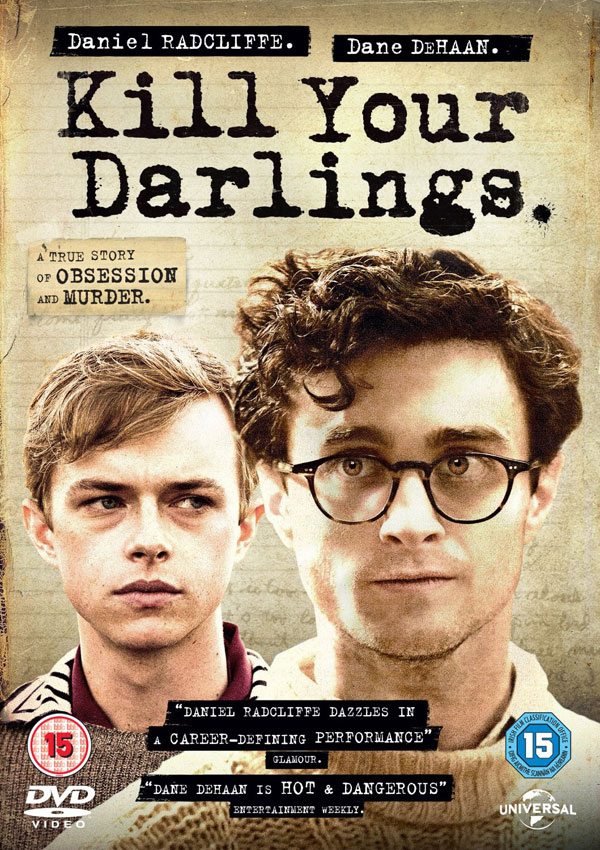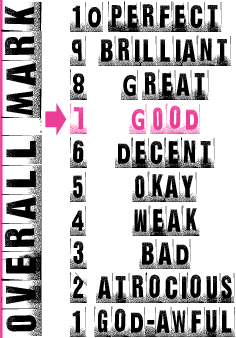
Director: John Krokidas
Running Time: 104 mins
Certificate: 15
Release Date: April 21st 2014 (UK)

When reading the press surrounding Kill Your Darlings, you could have been forgiven for thinking it was a movie all about Harry Potter having bum sex. Half the questions Daniel Radcliffe and director John Krokidas were asked seemed to be about the sex scene. However that’s only a very small part of the movie, and while Radcliffe does indeed get bummed, it’s merely part of a montage rather than anything with a big fanfare.
The movie is actually about some of the Beat generation writers and their brethren before they became well known, following one of the infamous events that helped shape who they were. Radcliffe plays Allen Ginsberg, who would go on to be the openly gay man behind the wonderful Howl. He heads to Columbia University, where he immediately riles against the college’s old fashioned attitude to literature and poetry.
He’s drawn to Lucien Carr (Dane DeHaan), a young man whose rebellious spirit – and good looks – seem to offer Allen what he’s looking for. Carr appears to offer something new, throwing out the straitjacket of tradition and offering a way forward, both personally for Ginsberg’s burgeoning homosexuality, and in his art. Through Lucien, Ginsberg meets the likes of William Burroughs (Ben Foster) and Jack Kerouac (Jack Huston), who are just starting to find their voice and create their own counterculture.
Then there’s David Kammerer (Michael C. Hall), a rather rarefied man who seems to like to keep young people around so they can fawn over his cultured airs. However it soon becomes apparent there’s something a little darker to him than that. He immediately dislikes Ginsberg, seeing him as a threat to his relationship with Carr – a relationship whose boundaries are confused and ill-defined.
Kammerer is infatuated with Carr, something Lucien somewhat fosters so that he can get the older man to write his essays for him. However Kammerer’s obsession eventually leads to dangerous places, as while Lucien thinks he has everyone wrapped around his finger, Kammerer isn’t about to be brushed aside without a fight. Through this, Ginsberg begins to realise that Carr may be more mouth than truth.
Kill Your Darlings is undoubtedly a very interesting movie, taking us into the early lives of some of the most important literary figures of the 20th Century. However it also knows it has a problem. No one knows the absolute truth of what happened between Carr and Kammerer. Lucien in particular is an oddly nebulous figure – so involved in the early days of the Beat generation (Ginsberg initially dedicated Howl to him, until Carr asked him not to), but whose role and actions have never fully been explained – and nor could they without pretending things were much simpler than they were.
Many movies would simply pick the most dramatic version and go for that, but Kill Your Darlings wants to acknowledge the difficulties surrounding the truth – which is more than fitting considering the amount of discussion there’s been about how much of the Beat generation’s writings reflect an objective truth and how much subjective. However it’s a tactic some will find frustrating, as rather than saying ‘this is what happened, and why’, it offers various possibilities, all of which serve the needs of a particular character at that point in their lives, and which they may know is a convenient fabrication even as they say it.
That’s particularly true when Carr’s best chance of beating a major criminal charge is by painting gay people as evil, predatory and that violence against them is perfectly reasonable, despite his own seemingly fungible sexuality. Indeed it was his legal defence and later refusal to fully discuss what happened that has obscured the truth of what occurred more than anything else.
It’s an interesting way of doing things but does mean you’ll come away with more questions than you went in with. It also ensures that if you like your movies to tell you what to think, you may have a few problems with Kill Your Darlings.
Radcliffe is very good, and it’s an interesting yet very smart choice to tell the story through his Ginsberg’s eyes, making him the central figure even though he was a somewhat unwitting figure in what happened. The former Harry Potter also does a better job at playing gay than many actors – not that he’s engaging in camp stereotypes or anything, but he realises that people aren’t just gay in the bedroom, but neither is their entire existence about their sexuality. Dane DeHaan meanwhile is very good in a pretty difficult role, simply because he has to play somebody who could be so many different things all at once.
Overall Verdict: Kill Your Darlings is a little frustrating, but because it’s dealing with something where the truth is so subjective and obscured (not least by the institutionalised homophobia of the age), that’s how it ought to be. It may not be a simple story, but it is a fascinating exploration of both the joyful rebellion and darkness that helped give birth to the Beat generation.
Reviewer: Tim Isaac





Leave a Reply (if comment does not appear immediately, it may have been held for moderation)